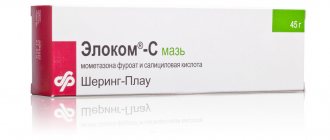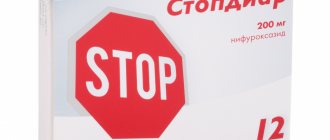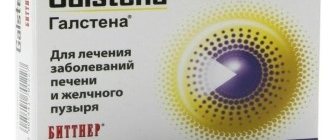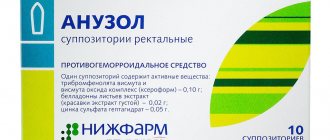Nosological classification (ICD-10)
- C80 Malignant neoplasm without specification of localization
- M02 Reactive arthropathy
- M02.3 Reiter's disease
- M06.9 Rheumatoid arthritis, unspecified
- M07.2 Psoriatic spondylitis (L40.5+)
- M10 Gout
- M14.1 Crystalline arthropathy in other metabolic diseases
- M19.9 Arthrosis, unspecified
- M45 Ankylosing spondylitis
- M47 Spondylosis
- M54.1 Radiculopathy
- M71 Other bursopathies
- M77.9 Enthesopathy, unspecified
- M79.1 Myalgia
- M79.2 Neuralgia and neuritis, unspecified
- N94.6 Dysmenorrhea, unspecified
- R51 Headache
- R52.2 Other persistent pain
- R52.9 Pain, unspecified
- T14.9 Injury, unspecified
Pharmacodynamics
Ketoprofen is an NSAID with anti-inflammatory, analgesic and antipyretic effects. Ketoprofen is well absorbed from the gastrointestinal tract, bioavailability is 90%. Communication with blood plasma proteins - 99%.
Ketoprofen penetrates into the synovial fluid and reaches therapeutic concentrations there. Metabolized in the liver. Up to 80% of ketoprofen is excreted by the kidneys, mainly in the form of ketoprofen glucuronide, and approximately 10% through the intestines. Due to rapid metabolism, its biological T1/2 is less than 2 hours. In elderly patients, the metabolism and elimination of ketoprofen occurs more slowly, but this is of clinical significance only for patients with reduced renal function. Ketoprofen does not have a negative effect on the condition of articular cartilage.
Ketonal price, where to buy
The price of Ketonal depends on the form of the drug.
The price of Ketonal in injections (ampoules 2 ml 100 mg) No. 10 varies from 230 to 305 rubles per pack; Ketonal ampoules No. 50 – 957 – 1490 rubles.
The price of Ketonal in tablets 100 mg No. 20 ranges from 200 to 210 rubles; tablets Ketonal Retard 150 mg No. 20 –235 – 302 rubles.
The cost of Ketonal in capsules 50 mg No. 25 is 105 – 115 rubles.
The price of Ketonal cream 5% in a 30 g tube varies from 230 to 297 rubles; 50 g – from 310 to 395 rubles.
The price of Ketonal gel 2.5% in a 100 g tube ranges from 338 to 466 rubles per package.
The price of Ketonal in candles No. 12 pieces varies from 283 to 345 rubles.
You can purchase medications without difficulty in most pharmacies in Moscow and other cities.
- Online pharmacies in RussiaRussia
- Online pharmacies in UkraineUkraine
- Online pharmacies in KazakhstanKazakhstan
ZdravCity
- Ketonal tablets p.p.o.
100 mg 20 pcs. Lek dd RUB 141 order - Ketonal suppositories rectal. 100 mg 12 pcs. Sandoz Ilach Sanai / Genveon Ilach Sanai
RUB 254 order
- Ketonal active granules for the preparation of a solution for oral administration 40 mg pack. 1g 12 pcs. Fine Foods & Pharmaceuticals N.T.M. S.p.A.
155 rub. order
- Ketonal solution for intravenous and intramuscular administration. 50mg/ml 2ml 10 pcs. Lek dd
RUB 241 order
- Ketonal gel 2.5% 50gLek dd/Salutas Pharma GmbH
RUB 369 order
Pharmacy Dialogue
- Ketonal (supp. 100 mg No. 12)Sandoz
RUB 237 order
- Ketonal (amp. 50 mg/ml 2 ml No. 10)Lek
RUB 222 order
- Ketonal 2.5% gel 50gSalutas Pharma GmbH
RUB 355 order
- Ketonal 2.5% gel 50gLek
RUR 366 order
- Ketonal gel (tube 2.5% 100g)Salutas Pharma GmbH
RUB 493 order
show more
Pharmacy24
- Ketonal 100 mg 2 ml No. 10 injection solution Lek pharmaceutical company d.d., Slovenia
204 UAH.order - Ketonal forte 100 mg No. 20 tablets Lek pharmaceutical company d.d., Slovenia
133 UAH order
- Ketonal 100 mg No. 12 suppositories Lek pharmaceutical company d.d. Slovenia / Sandoz Ilac Sanay ve Ticaret A.S., Turecchina
149 UAH order
- Ketonal retard 150 mg No. 2 tablets Lek pharmaceutical company d.d., Slovenia
182 UAH order
- Ketonal 2.5% 50 g gel Salutas Pharma GmbH, Nimechchina
93 UAH order
PaniPharmacy
- Ketonal capsule Ketonal capsules 50 mg No. 25 Slovenia, Lek
117 UAH. order
- Ketonal suppository Ketonal suppository 100 mg No. 12 Slovenia, Lek
152 UAH order
- Ketonal retard tablets Ketonal retard tablets 150 mg No. 20 Slovenia, Lek
198 UAH order
- Ketonal duo capsule Ketonal DUO capsules 150 mg No. 20 Slovenia, Lek
192 UAH order
- Ketonal forte tablets Ketonal forte film-coated tablets 100 mg No. 20 Slovenia, Lek
144 UAH order
show more
Contraindications
hypersensitivity to ketoprofen or other components of the drug, as well as salicylates, tiaprofenic acid or other NSAIDs;
a history of bronchial asthma, rhinitis or urticaria caused by taking salicylates (for example, acetylsalicylic acid) or other NSAIDs;
peptic ulcer of the stomach or duodenum in the acute stage;
nonspecific ulcerative colitis; Crohn's disease;
hemophilia and other bleeding disorders;
severe liver failure;
severe renal failure;
uncompensated heart failure;
postoperative period after coronary artery bypass surgery;
gastrointestinal, cerebrovascular and other bleeding (or bleeding);
chronic dyspepsia;
pregnancy (III trimester);
lactation period;
inflammatory diseases of the rectum and/or rectal bleeding;
children's age (up to 15 years).
With caution: history of peptic ulcer; history of bronchial asthma; clinically significant cardiovascular; cerebrovascular and peripheral arterial diseases; dyslipidemia; liver failure; hyperbilirubinemia; alcoholic cirrhosis of the liver; renal failure; chronic heart failure; arterial hypertension; blood diseases; dehydration; diabetes; anamnestic data on the development of ulcerative lesions of the gastrointestinal tract; smoking; concomitant therapy with anticoagulants and (for example, warfarin), antiplatelet agents (for example, acetylsalicylic acid), oral corticosteroids (for example, prednisolone), SSRIs (for example, citalopram, sertraline).
Side effects
Classification of adverse reactions according to the frequency of their detection: very often (≥1/10); often (≥1/100, <1/10); uncommon (≥1/1000, <1/100); rare (≥1/10000, <1/1000); very rare (<1/10000), including isolated reports; unknown frequency: there is insufficient data to estimate the frequency of development.
From the blood and lymphatic system: rarely - hemorrhagic anemia, purpura; unknown frequency - agranulocytosis, thrombocytopenia, pancytopenia.
From the immune system: unknown frequency - anaphylactic reactions (including anaphylactic shock).
Mental disorders: unknown frequency - dysphoria.
From the nervous system: infrequently - headache, dizziness, drowsiness, decreased or increased appetite; rarely - paresthesia; unknown frequency - convulsions, dysgeusia.
From the senses: rarely - blurred visual perception, conjunctivitis, ringing in the ears.
From the cardiovascular system: unknown frequency - heart failure, tachycardia, arterial hypertension, vasodilation.
From the respiratory system, chest and mediastinum: rarely - asthma; unknown frequency - bronchospasm (especially in patients with established hypersensitivity to acetylsalicylic acid and other NSAIDs), rhinitis.
From the gastrointestinal tract: often - dyspepsia, nausea, abdominal pain, vomiting, dry mouth; infrequently - constipation, diarrhea, flatulence, gastritis; rarely - stomatitis, peptic ulcers; unknown frequency - exacerbation of colitis and Crohn's disease, gastrointestinal bleeding and gastrointestinal perforation.
From the hepatobiliary system: rarely - hepatitis, increased levels of transaminases, increased serum bilirubin levels against the background of hepatitis.
From the skin and subcutaneous tissue: infrequently - rash, itching; unknown frequency - photosensitivity reactions, alopecia, urticaria, angioedema, bullous rash, including Stevens-Johnson syndrome and toxic epidermal necrolysis.
From the urinary system: unknown frequency - acute renal failure, tubulointerstitial nephritis, nephrotic syndrome, abnormal renal function tests.
General reactions: infrequently - swelling, fatigue; rarely - weight gain; the use of suppositories can cause local reactions - burning sensation, loose stools, irritation of the mucous membrane.
Interaction
Ketoprofen may weaken the effect of diuretics and antihypertensive drugs and enhance the effect of oral hypoglycemic and some anticonvulsants (phenytoin).
Combined use with other NSAIDs, salicylates (including acetylsalicylic acid), corticosteroids, ethanol increases the risk of developing gastrointestinal complications.
Simultaneous administration with anticoagulants (heparin, warfarin), thrombolytics, antiplatelet agents (ticlopidine, clopidogrel) increases the risk of bleeding.
When taking NSAIDs concomitantly with diuretics or ACE inhibitors, the risk of renal dysfunction increases.
The drug increases the plasma concentration of cardiac glycosides, CCBs, lithium preparations, cyclosporine, methotrexate.
NSAIDs may reduce the effectiveness of mifepristone. NSAIDs should be started no earlier than 8–12 days after mifepristone is discontinued.
When combined with pentoxifylline, there is an increased risk of bleeding. More frequent monitoring of clinical status and bleeding time is mandatory.
When combined with probenecid, the rate of plasma clearance of ketoprofen may be reduced.
Compound
- Solution - ketoprofen , propylene glycol, ethanol, benzyl alcohol, sterile water.
- Gel - ketoprofen, trolamine, carbomer , ethanol, lavender essential oil, sterile water.
- Cream - ketoprofen, isopropyl myristate, methylhydroxybenzoate, propylene glycol, propylhydroxybenzoate, white petrolatum, magnesium sulfate, elphacos ST9, propylene glycol oleate, glyceryl, water.
- Tablets - silicon dioxide, magnesium stearate, talc, corn starch, lactose, macrogol , hypromellose, titanium dioxide, indigo carmine, wax, talc.
- Capsules - ketoprofen, microcrystalline cellulose, lactose monohydrate, croscarmellose sodium, povidone, polysorbate, purified water, eudragit, triethyl citrate, talc, yellow iron oxide, purified water, silicon dioxide, titanium dioxide, gelatin.
- Suppositories - ketoprofen, solid fat, glyceryl caprylocaprate.
Directions for use and doses
Rectally.
Suppositories Ketonal® 100 mg are intended for rectal use. Usually 1 sup. is prescribed. (100 mg) rectally 1–2 times a day. Rectal suppositories can be combined with oral forms of the drug Ketonal®, for example, the patient can take 1 caps. drug Ketonal® (50 mg) in the morning and mid-day and administer 1 supp. (100 mg) rectally in the evening or 1 film-coated tablet, 100 mg in the morning and administer 1 supp. (100 mg) rectally in the evening. The maximum dose is 200 mg/day.
Ketonal's analogs
Level 4 ATC code matches:
Voltaren Emulgel
Ultrafastin
Indomethacin
Dicloran
Dicloran Plus
Dolgit
Nise
Ketorol
Febrofeed
Fastum gel
Diclofenac
Finalgel
Bystrumgel
Deep Relief
Butadion
Diklovit
Artrosilene
Olfen
Fanigan Fast
Analogs of Ketonal in tablets and capsules - Artrum , Ketoprofen , Indomethacin , Ibuprofen , Osteoartisi Active Plus , Artron Complex , Flamax Forte , Denebol , Ketoprofen MV , Chondra-Sila , Flexen , Bystrumkaps , Oruvel , Ultrafastin , Profenid and others.
Analogues of Ketonal in the form of a solution are Artrosilene , Diclofenac , Denebol , OKI , Emodol , Oruvel , Flamax , Flexen , Chondrolone and others.
Analogs of cream and gel Ketonal - Artrosilen , Ketoprofen , Voltaren , Febrofid , Bystrumgel , F-gel , Fastum- , Ketoprom , Oruvel , Ketum-gel , Reanimator Thermo-gel , Valusal , Arthropod , Ultrafastin , Fort-gel , Profenid , Flexen .
Analogues of Ketonal in the form of suppositories are Artrum , Oruvel , Flexen , Artrosilen .
The price of analogues may differ significantly from the cost of Ketonal. When replacing the drug, you should consult a specialist.
Overdose
Symptoms: develop during the use of ketoprofen in doses of up to 2.5 g. In most cases, the symptoms were mild, limited to drowsiness, nausea, vomiting and epigastric pain. There are no specific antidotes for ketoprofen.
Treatment: in cases of overdose when taking large doses, gastric lavage is recommended along with symptomatic and supportive therapy to compensate for dehydration, monitor diuresis and correct acidosis, if it develops. In patients with renal failure, hemodialysis is advisable to remove the drug from the systemic circulation.
Reviews about Ketonal
On the Internet you can find numerous reviews about Ketonal, mostly favorable. The most favorable reviews about Ketonal in tablets and injections:
- “... I had a kidney stone pass, hellish pain, neither baralgin nor other analgesics helped. The emergency doctor gave Ketonal injections and the pain went away almost immediately. An excellent pain reliever, not a narcotic and affordable.”
- “... I had a tooth removed. During extraction, the tooth crumbled and when they began to pull out the roots, there was hellish pain. But after the Ketonal injection I stopped feeling pain. A good cure for toothache."
- “... I suffer from osteochondrosis, for which I take Ketonal tablets and use cream, it helps a lot.”
Many patients leave good reviews about Ketonal cream and often call it “ointment”: “...my mother has been using Ketonal ointment for arthrosis for quite a long time. The drug relieves pain in the knee joints well and quickly. It’s not the cheapest drug, but it’s very effective.”
There are also negative reviews: “... I ride a horse. After the fall, my ankle began to hurt severely. I used the cream for a month. It didn’t help, the joint continued to hurt. We got “horse balm” at the hippodrome – excellent results.”
Those who are not familiar with the drug ask the question: “what is Ketonal ointment for?” It is successfully used for injuries to the ligamentous apparatus and muscles, which is very important for people leading an active lifestyle. What else can the ointment be used for? Local treatment in the forms of cream, ointment, gel is very effective for inflammation of the veins (phlebitis). In this case, NSAIDs are prescribed in parallel with venotonics and thrombolytics.
Reviews about the gel are also positive, and it is noted that this dosage form is absorbed more easily and quickly, without leaving marks on the skin and clothing; the use of the gel is more economical.
There are also numerous positive reviews about suppositories in gynecology: “... For me, the beginning of the menstrual cycle is almost always accompanied by severe pain. Whatever I drank. The emergency doctor recommended Ketonal suppositories and the pain subsided. Of course, the application procedure is not very pleasant. After inserting the suppository, I feel some discomfort (slight burning and itching), but they quickly relieve the pain and the effect lasts the whole day. Excellent product."
special instructions
Patients with inflammatory diseases of the rectum should not use Ketonal® rectal suppositories.
At the beginning of NSAID therapy, it is necessary to monitor the state of the blood and liver, and it is necessary to monitor renal function in patients with heart failure, cirrhosis and nephrosis, those undergoing diuretic therapy in patients with chronic kidney disease, especially the elderly. Taking ketoprofen in such patients can lead to a decrease in renal blood flow, which is associated with an inhibitory effect on PG, and decompensation of renal function.
It is necessary to be careful and monitor blood pressure more often when using ketoprofen to treat patients suffering from hypertension and cardiovascular diseases, which lead to fluid retention in the body.
Like other NSAIDs, ketoprofen can mask signs of infectious diseases.
Patients with bronchial asthma associated with chronic rhinitis, chronic sinusitis and/or nasal polyposis are more prone to allergic reactions to acetylsalicylic acid and/or NSAIDs, so the risk of an attack increases in this group of patients.
Women planning pregnancy should refrain from taking the drug, because the likelihood of egg implantation may decrease.
Treatment with Ketonal® should be discontinued at the first appearance of skin rash, lesions of the mucous membranes or other signs of hypersensitivity.
If visual disturbances, including blurred vision, occur, treatment should be discontinued.
Special precautions when disposing of unused medicinal products. There is no need for special precautions when disposing of unused Ketonal®.
Impact on the ability to drive vehicles and engage in other activities that require concentration and speed of psychomotor reactions. There is no evidence that the use of Ketonal® in recommended doses affects the ability to drive a car or operate moving machinery. However, drowsiness and dizziness have been reported, therefore, when these signs appear, patients are not recommended to drive or engage in other activities that require concentration and speed of psychomotor reactions.



